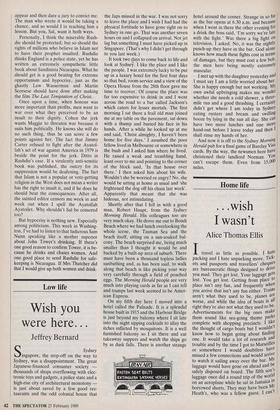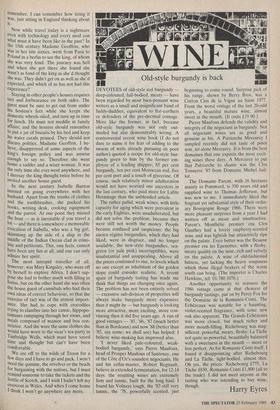Home life
...wish I wasn't
Alice Thomas Ellis
Itravel as little as possible. I hare packing and I hate unpacking more. Tick- ets and passports and travellers' cheques are bureaucratic things designed to drive you mad. They get lost. Your luggage gets lost. You get lost. Getting from place to place isn't any fun, and frequently when you arrive that isn't any fun either. Trams aren't what they used to be, planes are worse, and while the idea of boats is all right they're also not what they used to be. Advertisements for the big ones make them sound like sea-going theme parks complete with shopping precincts. I lik,e the thought of cargo boats but I wouldn't know how to begin going about finding one. It would take a lot of research and trouble and by the time I got to Marseilles or somewhere I would doubtless have missed a few connections and would arrive to watch it sailing away over the bar. MY luggage would have gone on ahead and be safely disposed on board. The fifth son's luggage once did a round trip of the world on an aeroplane while he sat in Jamaica In borrowed shorts. They may have been Tv!! Heath's, who was a fellow guest. I can t remember. I can remember how tiring it was, just sitting in England thinking about
it.
Now while travel today is a nightmare even with technology and every mod con what must it have been like in the past? In the 18th century Madame Geoffrin, who was in her late sixties, went from Paris to Poland in a berlin to see the king, of whom she was very fond. The journey was hell and when she got there she found she wasn't as fond of the king as she'd thought she was. They didn't get on as well as she'd expected, and which of us has not had this experience?
Staying in other people's houses requires tact and forbearance on both sides. The guest must be sure to get out from under his hostess's feet while she keeps the domestic wheels oiled, and turn up in time for lunch. He must not meddle in family affairs; and the hostess should remember to put a jar of biscuits by his bed and keep his water carafe primed. They should not discuss politics. Madame Geoffrin, I be- lieve, disapproved of some aspects of the king's foreign policy and was unwise enough to say so. Therefore she went home a sadder and a wiser woman. It was the only time she ever went anywhere, and I daresay the king thought twice before he invited another house guest.
In the next century Isabelle Burton insisted on going everywhere with her husband. Apart from the trunks of clothes and the toothbrushes, she packed his books, writing desk, cooking equipment and the parrot. At one point they missed the boat — as is inevitable if you travel a lot — and there is somewhere a memorable evocation of Isabella, who was a big girl, skimming up the side of a ship in the middle of the Indian Ocean clad in crino- line and petticoats. This, one feels, cannot have been any fun at all, and one can only admire her spirit.
The most intrepid traveller of all, however, was Mary Kingsley, who went off by herself to explore Africa. I don't sup- Pose she had to bother much with filling in forms, but on the other hand she was often the house guest of cannibals who had their own ideas of correct behaviour, so that the exercise of tact was of the utmost import- ance. She had to cope with crocodiles trying to clamber into her canoe, hippopo- tamuses rampaging through her room, and meals composed of manioc and boa con- strictor. And she wore the same clothes she would have worn to the vicar's tea-party in Tunbridge Wells, which must have saved time and thought but can't have been comfortable.
We are off to the wilds of Troon for a• few days and I have to go and pack. I won't need the quinine, the revolver or the beads for bargaining with the natives, but I must remind someone to take the tickets and the bottle of Scotch, and I wish I hadn't left my overcoat in Wales. And when I come home I think I won't gO anywhere any more.

















































 Previous page
Previous page